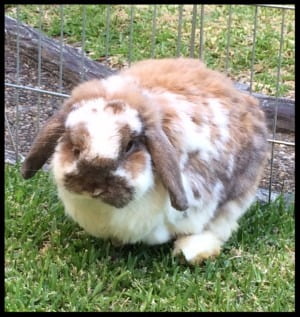Keeping you informed
Newsletter February 2018

Glam ‘n’ Go Grooming Salon
Glam ‘n’ Go Grooming Salon is a recent addition to Turramurra Vet Hospital.
If you haven’t already met Dave and Selena, our professional groomers, then they are looking forward to meeting you and your doggy pal.
Dave and Selena provide professional grooming services for us Tuesday, Wednesday and Thursday. Anything from a bath and blowdry to a styled (practical or cosmestic) haircut.
Contact us today on 9988 0198 to book in as spots fill up quickly!
Pet of the Month: Bun Bun
Did you know that bunnies can live as long as dogs? It is sad that rabbits are commonly known to only live 5 or 6 years. However, with the right care many rabbits reach their 10th birthday and some go a few years further.
Bun Bun, one of our long term patients is pictured here. He is a 9 year old Dwarf Lop Rabbit. Bun Bun is a very much loved member of his family and gets the best of care.
There are three main health problems with bunnies that can be easily prevented:
- Calicivirus and Myxomatosis. These two diseases are passed onto rabbits through direct or indirect contact (flies and mosquitoes) with infected rabbits. A Calicivirus vaccine is available. Please contact us on 9988 0198 to book your bunny in for vaccination and to discuss Myxomatosis prevention.
- Gastrointestinal Disease. Rabbits have long digestive tracts that are designed to continue moving. Anything longer than 12 hours without eating and/or pooping and a bunny can be in a lot of trouble. This can easily be prevented with correct diet (80% grass hay and 20% green leafy veggies) and ensuring that no obstructive materials (such as towels and blankets) are kept with the bunnies.
Dental Disease. Rabbits teeth grow continuously so they need to wear them down. Again, the correct diet will help prevent the majority of dental disease. Unfortunately some rabbits are born with poor tooth alignment and so their teeth don’t wear down effectively or at all. These rabbits may need regular teeth trimming and potentially removal of the problem teeth.
Planning a Move with your Pooch or Kitty?
Moving house can be stressful for all the family, including the family pet. Here are some tips for making the move easier on your furry friends.
- Board your pet while the move is completed, starting from the day before you would start packing your belongings to when your belongings will be unpacked in your new home. This reduces escapees and makes moving day less stressful for you as well as your pet avoiding seeing their beloved home rearranged. Call us today on 9988 0198 to book your cat into our cat boarding suites.
- If not boarding your pet, keep your pet in a secured room with their familiar belongings while the packing and moving is being done. Pack their things up last and then set them up first in a secure room in the new home while your home is being set up.
- If the pet your moving with is a cat, avoid replacing old furniture with new until your pet is settled in the new home. Cats leave their scent on furnishings to make a place familiar to them.
- Feliway (cats) and Adaptil (dogs) are two pheromone based products proven to reduce stress. They have no reported side effects. They can only be purchased from vets.
Don’t forget to update your pet’s microchip details. It is not uncommon for pets to go missing in the first days and weeks in a new home and a microchip is only useful if the correct contact details are on it. Create a personal account on Pet Registry to enable yourself to update contact details easily. You will need your pet’s microchip number. Please contact us on 9988 0198 if you don’t have the number.
Have you Got a Puppy Less than 16 Weeks of Age?
It is a wonderful and very exciting time. However, you have a puppy that will need both protection from disease and socialisation (puppies need to be introduced to many different people and vaccinated dogs before 16 weeks of age). But, how do we manage both?
Soon after puppies are born, they receive some immunity in the mother’s milk including antibodies that the mother has developed due to vaccination or disease exposure. While these antibodies help protect the puppies from diseases they may encounter, these antibodies can fight off vaccines.
The time when these antibodies from the mother disappear varies between pups (even those within the same litter). However, we want to ensure that the puppy is covered against those diseases when the antibodies do disappear. This is why we give 3 vaccines (typically at 6-8 wks, 10-12 wks and 16-18 wks).
With each vaccine, comes the greater possibility that the vaccine has not had antibodies fighting it off and will offer some protection. However, until the final puppy vaccination, we won’t know if this has happened. That is why it is best to manage the outings of young pups.
Immunity is best achieved post vaccine after 7 days.
For puppies who have had their 6-8 wk vaccine, socialisation should be limited to your enclosed property, the enclosed property of friends and family (with vaccinated pets), outings within a crate/carry cage and a well run indoor puppy class (such as Turramurra Vet’s puppy class). Call us today on 9988 0198 to book your puppy in to our puppy classes.
For puppies who have had their 10-12 wk vaccine, walks on hard surfaces can be added to the above. Avoid grass/soil areas and dog parks.
For puppies who have completed their puppy vaccine course, the entire world is open for exploration.
Happy Socialising.




